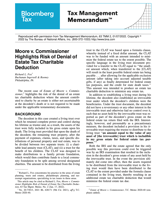Under the “assignment of income doctrine,” an individual who has earned income and is otherwise...
Recent Case a Harsh Reminder That Charitable Contribution Deduction Will be Disallowed for Failure of Donor to Obtain “Contemporaneous Written Acknowledgement” From Charity
For any contribution to charity of $250 or more, a charitable income tax deduction will be disallowed in full unless the donor substantiates the contribution by obtaining a “contemporaneous written acknowledgment” from the charity. For a contribution to a donor advised fund, the acknowledgment must also state that the charity “has exclusive legal control over the assets contributed.” Although charities routinely provide these acknowledgments to their donors, the obligation to obtain an acknowledgment rest solely upon the donors.
In a harsh reminder of the absolute need to obtain a contemporaneous written acknowledgement meeting the IRS requirements, in a case decided on July 6th, the court in Keefer v. U.S. disallowed a claimed charitable income tax deduction in the amount of $1,257,000 simply because of the taxpayer’s failure to obtain the required acknowledgment. The court stated that the “IRS properly denied the deduction for this reason.”
It is important to note that the donor must obtain the written acknowledgement from the charity before the earlier of (a) the date on which the donor files the tax return for the taxable year in which the contribution was made or (b) the due date (including extensions) for filing such tax return. An acknowledgment obtained after this date, including during the course of a possible subsequent IRS audit, will be deficient and, accordingly, will not support the deductibility of a claimed charitable income tax deduction. Donors making substantial contributions to charity will be well-served to obtain the acknowledgment at the actual time the contribution is made, rather than risk the possibility of not obtaining it at a later date.



